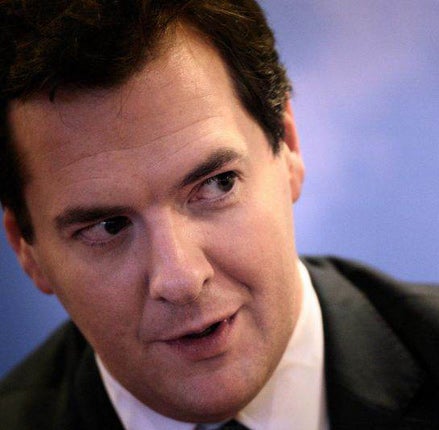George Osborne finds favour in business poll as Alistair Darling's credibility sinks
Shadow Chancellor 'has the right ideas' on the economy despite his lack of experience

George Osborne is seen as "lacking experience" by Britain's business leaders but still outscores the Chancellor, Alistair Darling, according to a survey for The Independent. The ComRes poll of 165 businessmen found that that 67 per cent of them believe Mr Osborne would make a better chancellor than Mr Darling. Some 45 per cent say they are confident in the shadow Chancellor's ability, while only 24 per cent have confidence in the Chancellor.
On Wednesday, Gordon Brown answered Tory claims he was “at war” with his Chancellor by saying he would much rather defend Mr Darling than be in David Cameron’s position of having to defend Mr Osborne. But the survey suggests that the shadow Chancellor is in the stronger position in the business community as the general election approaches.
Sixty-seven per cent of business leaders believe that Mr Osborne understands business, while only 27 per cent say the same about the Mr Darling. Although 39 per cent describe Mr Osborne as “out of his depth”, 71 per cent think Mr Darling is.
Sixty-three per cent think the shadow Chancellor has the right ideas about how to manage the British economy, while only 30 per cent believe the Chancellor is handling the economy responsibly during the global economic crisis.
Mr Darling’s 24 per cent “confidence rating” among businessmen is the lowest among eight senior politicians mentioned by ComRes. He trails Kenneth Clarke, the shadow Business Secretary, who came top on 70 per cent; Vince Cable, the Liberal Democrat Treasury spokesman (63 per cent); Mr Cameron (60 per cent); Mr Osborne (45 per cent); Lord Mandelson, the Business Secretary (35 per cent); Mr Brown and Nick Clegg, the Liberal Democrat leader (both 26 per cent).
However, the poll suggests that Mr Osborne has failed to reassure all his critics in the business world despite a charm offensive in recent months after Labour claimed he was the Tories’ “weakest link”. The proportion of business leaders who think he lacks experience, a criticism levelled at him by some in the City of London, has risen from 68 per cent last October to 74 per cent.
Some have criticised the lack of detail about spending cuts in a City lecture given by Mr Osborne on Wednesday. Martin Weale, of the National Institute of Economic and Social Research, said: “I do think [Mr Osborne] really didn’t provide the detail that people will be looking for in a run-up to an election.”
Some Tory MPs expressed unease at the shadow Chancellor’s decision to announce limited “in-year” cuts in an emergency Budget within 50 days if the Tories win the election, with a wider departmental spending review delayed until the autumn. Tory critics warned that the party’s plans lacked the credibility to prove Britain was serious about slashing the £178 billion deficit. One MP said: “We need to give the voters clarity – and we still aren’t.”
Mr Osborne said yesterday: “There will not be token cuts. There will be real cuts but there will not be swingeing cuts.” He added that the next government would have to be tougher on public spending than the Thatcher Government. He told the BBC: “ Whoever wins the election, Labour or Conservative, is going to have to cut spending. That is not something that Margaret Thatcher actually did. So tougher than Margaret Thatcher. But that is true of a re-elected Labour Government as well as a new Conservative Government.”
Mr Osborne said he would not “shy away” from tough decisions on spending but would do it in a “careful and co-ordinated” way. If the next government did not act quickly after the election, he said the UK – like Greece – risked losing the confidence of the financial markets and its own ability to control events.
However, George Magnus, senior economic adviser to UBS, warned that Tory plans for some immediate cuts could spark a “savage” reaction in the currency markets and a ratings downgrade for the UK.
Liam Byrne, the Chief Secretary to the Treasury, said last night: “Now that we know the Tories will cut in 2010, he must come clean about the other cuts he is concealing. The Tories’ talk on the deficit is getting more and more aggressive but the detail of their plans if anything is getting cloudier and cloudier.”
For the Liberal Democrats, Mr Cable said: “Slashing spending now could push the economy back into recession and inflict further structural damage on the UK that will make it harder to sustain our credit rating.”
Green shoots: Nipped in the bud
Business leaders see no more signs of "green shoots" than they did last month, according to the ComRes survey. The proportion of businessmen who detect signs of economic recovery in their sector jumped from 36 per cent in December to 48 per cent in January but dropped back slightly to 47 per cent this month. Forty-one per cent saw no "green shoots" and 12 per cent replied "don't know".
The findings underline the fragile recovery of the economy, which grew by a meagre 0.1 per cent in the final three months of last year, prompting fears that the UK could suffer a "double dip" recession.
Although the uncertain outlook has dented Labour's claims to have steered the economy out of trouble, it has also caused a headache for the Tories, who have softened their stance over the scale of spending cuts they would make this year.
Join our commenting forum
Join thought-provoking conversations, follow other Independent readers and see their replies
Comments
Bookmark popover
Removed from bookmarks